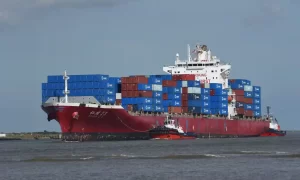
China’s trade with Russia jumped by more than 12% in March from a year earlier, outpacing the increase in Beijing’s trade with the rest of the world, according to Chinese customs data.
Shipments to and from Russia increased 12.76% in March to $11.67bn, Chinese customs data showed on Wednesday, slowing from 25.7% growth in February, when Russia launched its invasion of Ukraine.
The decline in trade with Russia was less severe than the decline with other countries, fuelling concerns that China has maintained strong links with Moscow despite the atrocities perpetrated by the Russian military in Ukraine.
China’s growth in trade during March with the rest of the world was only 7.75%, after it increased to $505bn.
Beijing has refused to call Russia’s action an invasion and has repeatedly criticised what it says are illegal western sanctions to punish Moscow.
Several weeks before the attack on Ukraine, China and Russia declared a “no-limits” strategic partnership, whereby there are no forbidden areas of cooperation. Last year, total trade between China and Russia jumped 35.8% to a record $147bn.
As sanctions against Russia mount, western countries fear China could offset some of its neighbour’s pain by buying more from it. Russia is a major source of oil, gas, coal and agricultural commodities for China.
But analysts told Reuters they have yet to see any major indication China is violating western sanctions on Russia.
A spokesperson for Chinese customs, Li Kuiwen, said China’s economic and trade cooperation with other countries including Russia and Ukraine remains normal.
A group of German policy institutes said Germany could be plunged into recession if Europe’s largest economy is forced to block imports of Russian gas. German GDP would fall by 2.2% next year after a full EU embargo on Russian energy, wiping out more than 400,000 jobs, according to revised estimates of German GDP growth over the next two years.
The EU last week agreed to ban coal imports from Russia from August. The German chancellor, Olaf Scholz, is under pressure to agree tougher measures, including a ban on gas imports. Germany depends on Russia for 40% of its gas imports.
The research institutes predicted that if all energy supplies from Russia were cut off instantly, growth in Europe’s largest economy would slow sharply from 2.9% last year to 1.9% this year, before shrinking in 2023.
They said: “The cumulative loss of GDP in 2022 and 2023 in the event of a supply freeze is likely to be about €220bn [£180bn].”
Without a ban on energy imports from Russia, the institutes said growth this year would be 2.7% compared with a previous estimate of 4.8% made last autumn.
The German government said it is working to reduce that dependency, but said it needs time to exit Russian gas altogether and has opposed an immediate stop to supplies.
Read more:
China’s trade with Russia up by 12% in March from a year earlier




